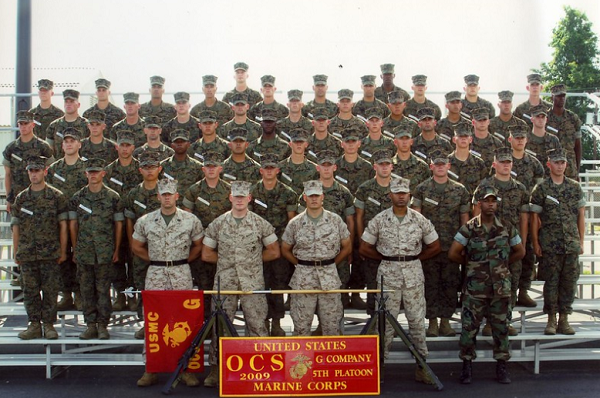Becoming a Marine Corps Officer is an accomplishment only attained by few.
The path to becoming a USMC Officer can involve attending Marine Officer Candidate School.
This course challenges individuals in every way imaginable.
We will discuss what OCS is, what it is like, how you get there, what happens after, and then compare Marine OCS to Army OCS.
Continue reading for your complete Marine OCS Guide.
Need Help Acing The OCS Test?
 Looking to improve your Officer Candidate School (OCS) Test scores?
Looking to improve your Officer Candidate School (OCS) Test scores?
If so, you need to check out the Mometrix ‘Officer Candidate Tests Secrets Study Guide‘.
It’s packed with info on exclusive test taking techniques like:
- Keys to questions that give away the wrong (or right) answers
- Super Speed methods to get through the questions you know with ease
- How to manage your time on the test efficiently
- and much more
Click Here to visit the official Mometrix site to learn more.
Table of Contents
1. What is Marine OCS?
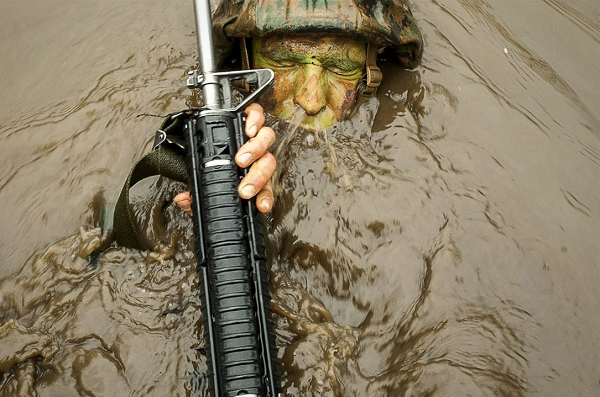
Marine Officer Candidate School is located on Marine Corps Base Quantico in Virginia.
OCS is where future Marine officers go to receive leadership training.
During this time, officers will learn military customs, physical fitness, land navigation, and tactical training.
The intent of OCS is to train Marine Corps members to have the knowledge and skills necessary to lead in a challenging environment.
This is done through controlled scenarios that allow individuals to be evaluated and screened both physically and academically.
Intense moral, mental, and physical challenges placed on the Marine will allow them to meet the strict standards the Marine Corps has for their officers.
Related Article: 13 Pros And Cons Of Joining The Marines
2. How Long Is Marine OCS?
Marine OCS is just over 10 weeks long.
It is broken into five phases that make up the 10-week course.
Phase lengths:
- Phase 1 In-Processing: Days 1-4
- Phase 2 Transition: Week 1-3
- Phase 3 Adaptation: Week 4-5
- Phase 4 Decision Making and Execution: Week 6-9
- Phase 5 Out Processing: Week 10
3. How Are They Evaluated?
Future Officers are evaluated in three categories.
They are evaluated on leadership, academics, and physical fitness.
Related Article – Marine Corps PFT Standards
Leadership
The primary focus of OCS is on leadership training with 50% of the overall focus being on leadership.
Marines are evaluated during Command Evaluations, Leadership Reaction Courses, and Small Unit Leadership Evaluations with both staff observation and practical application.
These opportunities focus on command presence, decision making, leading subordinates, and communication skills.
Academics
Students will be evaluated with 25% of the focus on academics.
Academics include military subjects such as Marine Corps History and Land Navigation.
Evaluations take place with written exams and practical application.
Physical Fitness
Although physical fitness only accounts for 25% of the overall evaluation, it is very strenuous and demanding.
Future Officers are expected to learn will-power, physical courage, and determination through a series of physical fitness applications.
These applications include hikes, courses, circuits, and the Combat Fitness Test.
Specific exercises include hikes from 4-9.3 miles, 2.5 mike endurance course, 100-meter obstacle course, pugil stick training, and more.
Related Article – ASVAB Scores for Marine Corps Jobs
4. What Are the Responsibilities of Marine Corps Officers?
Marine Corps officers are responsible for being leaders above anything else.
They are taught to have character, unselfishness, resilience, and courage.
Each officer will have a primary MOS in ground, air, or law.
Within that field, they may be responsible for duties such as training planning, coordinating work activities, and administrative document control.
After completing their first tour, they will serve in non-MOS related careers, such as recruiting.
5. How Do You Get To Marine OCS?
To qualify for Marine Corps OCS, you must be at least 18 years old and be commissioned prior to turning 28.
You must be a U.S. citizen and have a four-year college degree, or be close to finishing a four-year degree.
Future Marine officers must meet the general physical and medical requirements to enter into the Marine Corps.
Those who wish to become a Marine Corps officer will meet with an Officer Selection Officer (OSO) who will help you with the entire application and entrance requirements.
They will also be required to submit SAT/ACT scores, GPA, and submit an application for review by the board.
The application will include a letter of interest, reference letters, information relating to extracurricular activities, and the Marine Corps Physical Fitness (PFT) score.
Included in the application will be information from your MEPS visit.
Once the information is submitted, and the review board has convened, you will either be approved for the next open class, delayed entry into the following open class, or denied.
Related Article – Joining The Military After College: How To Do It The “Right” Way
6. What Is Taught At Marine OCS?
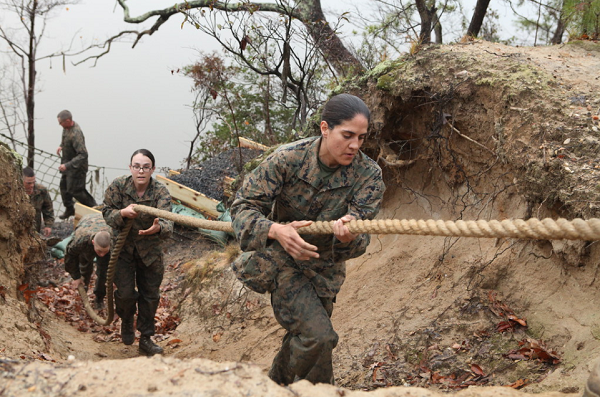
Marines are taught to be skilled leaders in any scenario.
They are taught the Marine Corps Martial Arts Program, Marine Corps policy and history, basic lifesaving procedures, problem-solving, negotiation, and stress control.
Officers are taught over a 10-week course that includes Small Unit Leadership Evaluation, testing individuals on mental, physical, and moral development.
The first few days of Marine OCS are spent processing candidates into the facility, including administrative and medical processing, gear hand-out, and being placed in their training company.
Future officers will also take the Initial Physical Fitness Test during this time and learn basic military customs.
Weeks 1-3 are considered Phase two.
Officers will learn general military subjects, attend the Marine Corps Martial Arts Program and learn leadership and Marine culture.
The first three weeks are known as the hardest, both physically and mentally.
During weeks four and five, officers will begin to be evaluated.
This phase is called Phase three adaption and provides officers with increased responsibility.
They will go over land navigation, basic tactical training, and leadership emphasis.
The fourth phase takes place over weeks 6-9.
Marines will be tested through leadership events and their ability to exhibit tactical knowledge in a field environment.
They are tested physically and academically.
Phase five, the final phase, will include graduation and commissioning.
Related Article – Marine Corps Boot Camp Graduation
7. How Hard Is Marine OCS?
Marine OCS is one of the most difficult officer training programs out there.
It requires you to be physically and mentally tough while running on little sleep.
One former Adjutant described the attrition rate for women at 50% and men around 25%, stating that it was, “pretty hard.”
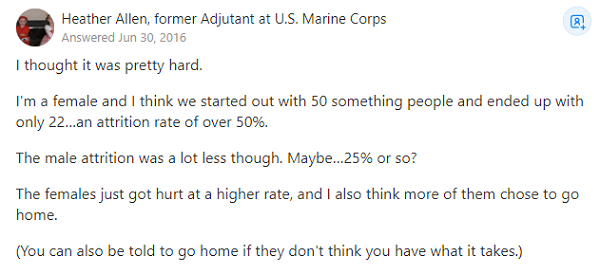
Another stated that you are constantly being evaluating on performance and attitude, and that it is very physically demanding.
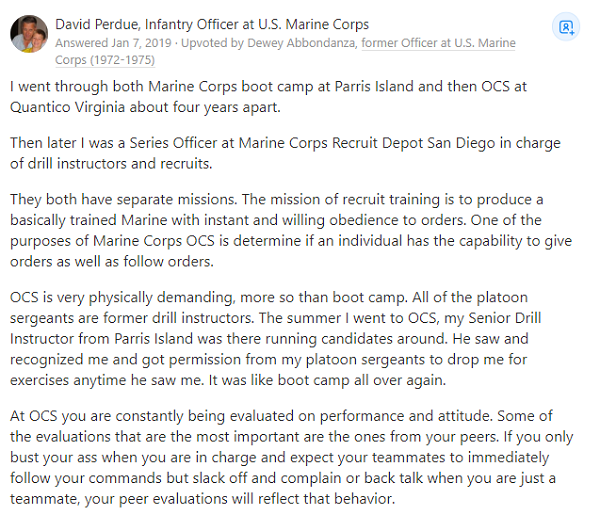
OCS is used to ensure that only the best become commissioned officers.
While most describe it as very difficult, people agree with this retired USMC officer when he said that it may be difficult, but he would not change his decision.

Related Article – How To Get Into West Point Military Academy
8. Marine OCS vs. Army OCS
Both Marine OCS and Army OCS result in an officer commissioning, but the two paths have several similarities and differences.
Similarities
- Commissioning: After commissioning, you will become a Second Lieutenant in both the Marine Corps and Army.
- Physical Fitness Entrance Requirements: Both the Army and Marine OCS have strict Physical Fitness Testing requirements.
- Citizenship: Both require applicants to be U.S. Citizens.
- Clearance: Army and Marine Corps officers must meet Secret security clearance.
- What you learn: Officers learn leadership, physical strength, and mental strength in both components.
Differences
- Length: Army OCS is 12 weeks versus 10 weeks for Marine OCS.
- Age: The Army requires individuals to be between the ages of 19 and 32, with the requirement of being commissioned prior to turning 34. The Marine Corps requires commissioning prior to turning 28.
- Structure: The Marine Corps training structure is completed in five phases, including introductory training to final assessments. The Army breaks their training into two phases. The first includes all training and the second phase is an 18-day training mission to test abilities.
- Physical Fitness: Both are physically demanding courses, but the Marine Corps tends to be more physically demanding.
Related Article – Marine School of Infantry
9. What Happens After Marine OCS?
After OCS, Marines are commissioned as Second Lieutenants and attend The Basic School.
The Basic School is located at Quantico, Virginia, as well.
This portion of training will advance leadership skills and work on improving war-fighting skills as a commander.
The Basic School lasts six months.
They will learn advanced Martial Arts and fighting skills and become skilled riflemen.
After completing The Basic School, officers will attend training in their ground, air, or law MOS.
Training times and locations will vary based on the MOS selected.
Related Article – USMC PFT/CFT Calculator
Quick Frequently Asked Questions
What are the requirements for Marine OCS?
To qualify for Marine Officer School, you’ll need to be between 18 and 28, be a U.S. citizen, and have a four-year degree. You’ll also need to meet high physical and medical fitness standards.
What rank is an OCS candidate?
For pay purposes, a Marine Corps OCS candidate ranks as an E-5, unless a higher rank was achieved previously as an enlisted member.
What happens if you fail Marine OCS?
Depending on why, you may be simply sent home. However, if you were injured during training and cannot complete the program, you may be offered an opportunity to return depending on how fit a candidate you were before the injury.
Is OCS harder than boot camp?
Boot camp for Marines is shorter, but the physical demands of OCS are more intense and more is expected of you in a leadership position. OCS requires stronger leadership skills, while boot camp teaches you to follow orders.
What is the attrition rate for Marine Corps OCS?
The drop out rate of Marine Corps OCS is estimated at 50% for female candidates and 25% for males.
Related Article – Marine Corps Boot Camp Graduation Gift Ideas
Conclusion
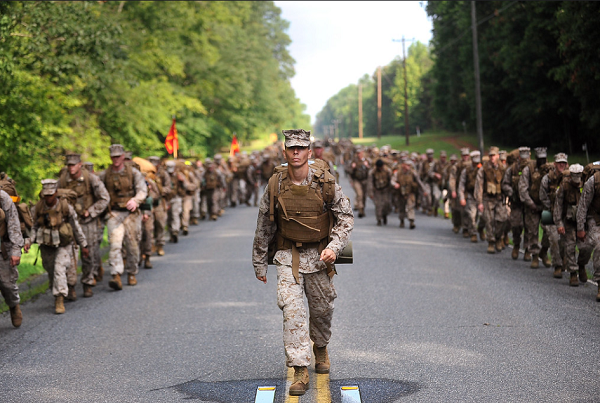
Marine OCS is a 10-week course located in Quantico, Virginia, for future Marine Corps officers.
After completing all entry requirements, future officers will learn leadership skills through educational, physical, and mental evaluations.
OCS is described as very difficult, with strength and determination being required to complete the course.
After OCS is complete, Marines move onto The Basic School before completing MOS training.
While it can be compared to the Army’s OCS and other officer training courses, there is no true comparison to this leadership course.
Related Article – Navy SEALs vs. Marines
References
- 5 Best Jobs for Female Marines - June 20, 2024
- 10 Best Marine Corps Recruiting Videos of All Time - June 20, 2024
- Marine Corps Requirements - June 20, 2024
Originally posted on February 6, 2020 @ 11:38 pm
Affiliate Disclosure: This post may contain affiliate links. If you click and purchase, I may receive a small commission at no extra cost to you. I only recommend products I have personally vetted. Learn more.
